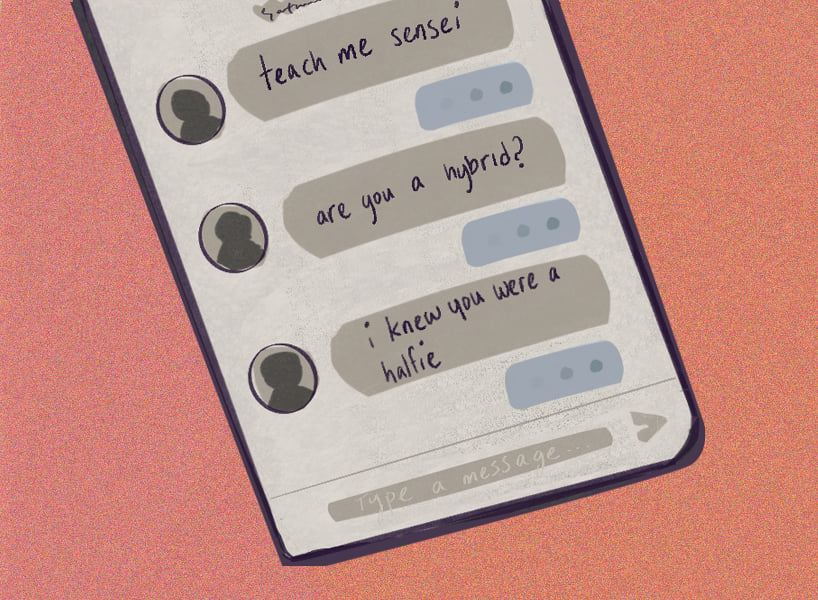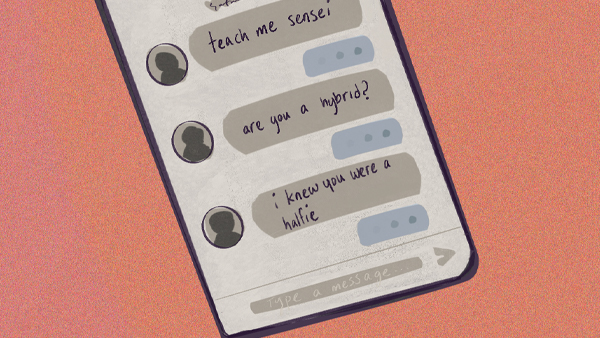Is Racial Stereotyping on Dating Apps Getting Worse?

“Where are you from?” an Asian-Canadian man asks me on the dating app Hinge. “I’m from here! You as well?” I respond. The conversation moves on. A couple hours later he returns to the topic. “What’s your background Anna??” My ambiguous identity is a mystery he is clearly determined to solve. I cave. “My mom’s white and my dad’s Korean,” I respond. “I knew you were a halfie, I just wanted to confirm,” he says.
It could’ve been worse. I wasn’t subjected to sexually aggressive racism like what this Zimbabwean woman in Newfoundland experienced on Plenty of Fish. Or told, as my Asian-Canadian friend Rebecca has been, that I must be smart and quiet like a “typical Asian girl”. But my exchange was one of countless throughout my digital dating journey in which my ethnicity has been the entry point of conversation. How could I possibly be charmed by pick-up lines like “Are you a hybrid?” and “Teach me sensei”? (Sensei is a teacher of Japanese martial arts and, yes I had to Google it.)
When I first started swiping eight years ago, I saw weeding out the white men with a bad case of yellow fever as the price I had to pay for participating in online dating. But a part of me couldn’t blame them—up until then, Asian women were rarely seen in media, or even worse, depicted as one of two stereotypes: either the submissive “china doll” (hello, Memoirs of a Geisha) or the sexually aggressive “dragon lady” (think Lucy Liu in Charlie’s Angels). But this is 2020; we now have nuanced portrayals of Asian women on screen with complex characters like Sandra Oh in Killing Eve and Lana Condor in To All the Boys I’ve Loved Before. We’re also living in the post-#MeToo era, and while white men seem to have become more careful about what they say upon first message exchange (now it can take several dates before I detect an Asian fetish), my experience suggests some Asian men have yet to catch on.
We’re supposedly living in a post-racial society, and yet dating preferences and behaviours remain largely racialized. And OkCupid founder Christian Rudder thinks our racial biases might actually be getting worse, not better. After comparing OkCupid data from 2009 to 2014, he found “the one thing that had changed was users’ willingness to proclaim they had no racial preference, while still clearly acting on the same racial prejudices,” as reported by Aaron Sankin for The Kernel. It appears our ingrained racial biases continue to determine our swipe-right habits and what we say online, in other words—our racial behaviours haven’t caught up to our egalitarian beliefs.
You would think we would be moving beyond judging prospective partners based on their race given that interracial dating in Canada has been steadily on the rise since 1991, according to Statistics Canada (2018). But an Ipsos poll conducted last year revealed that at least 15 percent of Canadians have stated they would never have a relationship with someone outside their race while Statistics Canada (2018) has found that two of the largest visible minority groups in Canada—South Asians and Chinese—have the fewest number of interracial relationships. On the extreme end, we’ve even seen the rise of the “Angry Asian Man,” online trolls who harass Asian women for partnering with white men. In her article for The Cut, author Celeste Ng explains that “in the eyes of these men, interracial relationships and multiracial children are ‘eugenics’—selectively ‘breeding’ Asian men out of existence—but inter-Asian marrying to create ‘pure’ Asians is commendable.”
Could monoracial dating really be thriving in a city as diverse as Toronto? While I’ve never used dating platforms designed exclusively for Asians like EastMeetsEast or Timphop Asian Dating, I have been increasingly swiping right on Asian guys because I assume they know what it’s like to be racially objectified and won’t stereotype me the way white men have. As Kenji Yamazaki, cofounder of EastMeetsEast tells GQ, “at least you [Asian men] aren’t rejected for your ethnicity. On the other hand, Asian women can be assured that they aren’t being accepted solely because of theirs.” I can see how dating someone of your own ethnicity seems safer, free of racial judgment.
Yet all the racialized comments I’ve received lately on dating apps have come from Asian, not white, men. And my experience isn’t unique—I’ve heard similar stories from Asian female friends, such as Sydney, who was picked up by an Asian guy for looking like Awkwafina (whom she bears little resemblance to). It isn’t just Asian men who demonstrate inter-group stereotyping and discrimination. American-born Asian women on EastMeetsEast have even been found to favour partners who are less “fobby” than them (as in, less “fresh off the boat” and more assimilated into western culture). EastMeetsEast also uses Asian stereotypes in their advertisements, such as a selfie of an East Asian woman with the slogan “Just like Dim Sum…choose what you like.” It appears even the creators and users of these dating apps have internalized racism.
But maybe I do too. I’m an Asian-Canadian woman who denounces yellow fever yet I usually am attracted to white guys IRL (and I’m not the only one). Growing up in predominantly Caucasian communities, I’ve always been most attracted to white men because I relate more to their culture than my Korean roots. But I also think my bias stems from associating white men with desire and success. I should’ve known I had internalized racism the moment I felt no shame in telling my white high school friends, “I like guys with boat shoes”—the quintessential, stereotypical signifier of a rich, white guy. Was I being racist or did I just have a “type”?
I might not be racist because my relationships that develop the furthest tend to be with white guys, but I am a product of a racist society. The implicit-association test, created by Anthony, Debbie McGhee, and Jordan Schwartz in 1998, has demonstrated how the brain subconsciously associates stereotypes with images of facial features. It makes sense that the rapid-fire, visual nature of swiping would make online dating platforms fertile ground for my deeply ingrained racial biases to play out through my thumbs. But it also provides an enabling environment for those who do cross the line to insult without penalty, and as a result, never question their own prejudices.
How do we counter the reductive nature of these apps, to ensure we’re seen and loved for who we really are and not just the snapshot we offer in our profile pictures and bios? It starts at the top, with dismantling the stereotypes we absorb through our screens. While Crazy Rich Asians was seminal for its all-Asian cast, I didn’t see my story as a mixed-race person represented. Given that mixed Asian-white women are considered among the most popular and exoticized of racial groups on dating platforms, we need more (and better) media portrayals of us, so that we can stop questioning whether interest in us online is simply a desire to determine “where we’re really from.” Beyond the big screen, we’ve seen the powerful role our phone screens play in shaping real-life relationships. Online dating platforms can be more strategic when designing their filters, matching algorithms and guidelines to make it harder for users to act on their subconscious racial biases, and to penalize them when they do.
But most importantly, it comes down to self-reflection. Confronting our dating habits and inherent biases may be easier than you think—there is evidence that we can change our racial preferences simply by making the first move. A 2013 study by Kevin Lewis, a sociology professor at the University of California, San Diego found that once a user messaged someone of a different race, their interactions across racial boundaries increased by 115 percent. Like any prejudice, exposure seems to be the key to overcoming discrimination.
I can’t blame any of the Asian guys on Hinge for basing their interest in me on my ethnicity any more than I can blame myself for once measuring the attractiveness of a man by the whiteness of his boat shoes. Judging someone by their appearance is inevitable when forming a new relationship online, but stereotyping based on race, and acting on it, only serves to further isolate us. I like to think we all have the capacity to hack our desire and deconstruct our biases; to undo the conditioning we’ve grown up with so that we can start making our morals our reality—online and offline.
The post Is Racial Stereotyping on Dating Apps Getting Worse? appeared first on FASHION Magazine.
